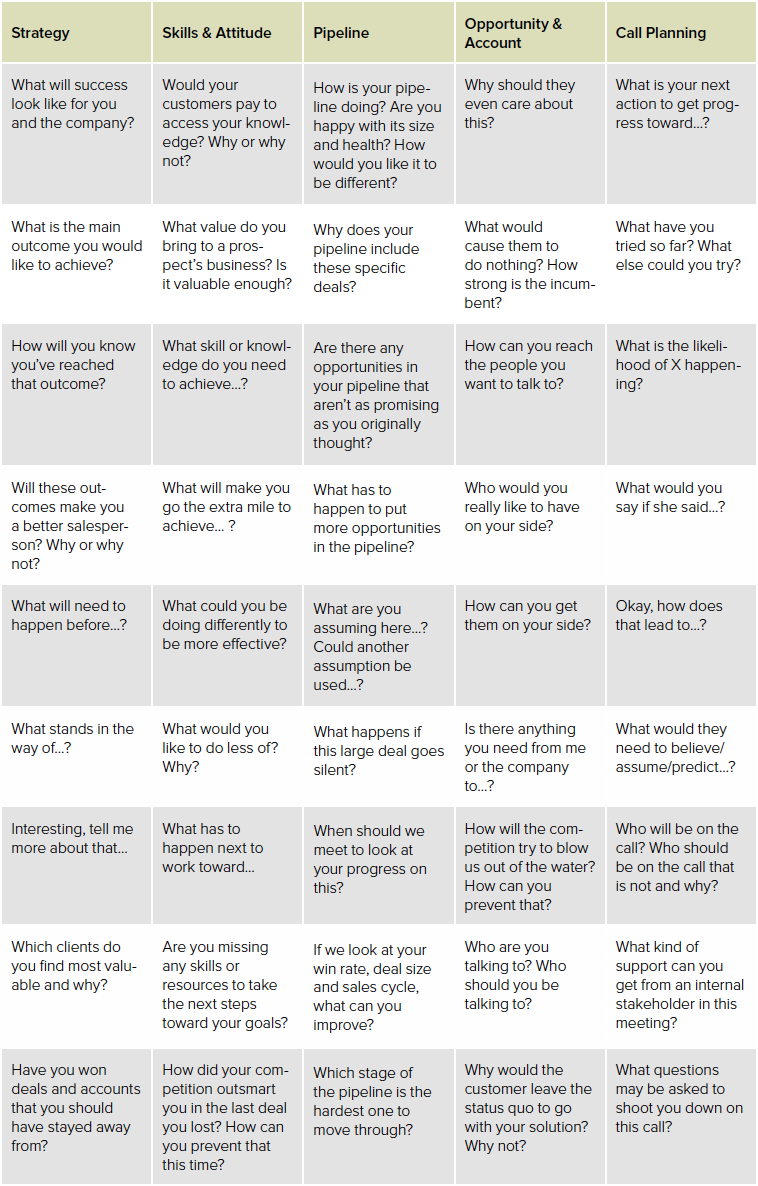
How to ask better coaching questions
Great coaching makes it easy for your sales team to execute on sales process and methodology. It supports skills growth and reinforces the right behaviors at the right times. It also improves ramp-up times and reduces excessive turnover.
Along with the right mindset, one of the most important qualities of a great coach is the ability to ask good questions. Rather than just teaching or managing, a great coach uses effective questioning to help the salesperson understand for themselves what needs to happen next.
One way to help coaches improve their question-asking skills, is to provide them with sample questions for various common scenarios. We pulled together a list of coaching categories, and associated each one with key coaching questions in the chart below, as a starting point.

Let’s take a closer look at how to use these questions.
Strategy Questions
Sometimes, a salesperson needs help understanding the big picture. They may have lost track of how they fit in the organization, or perhaps they aren’t showing strong motivation. They may be stuck in “busy-ness,” simply trying to work hard without any clear direction for their work.
Strategy questions can help lift a salesperson out of the weeds and into a stronger sense of purpose and drive. These questions will be high-level and open-ended, and may include:
- What will success look like for you?
- What will your success look like for the company?
- What is the main outcome you would like to achieve?
- What needs to happen before you can achieve that?
- Which clients do you find most valuable, and why?
These questions guide the salesperson to gaining their own sense of purpose, and directing their efforts to support both their own strategic goals and those of the organization.
Skills and Attitude
When a salesperson’s success is hindered by a lack of skills or attitude, it’s the coach’s job to guide them to an awareness of what they lack, while simultaneously inspiring a desire to remedy the gap.
This can be challenging when egos get in the way. Using questions rather than attacks can help ease the conversation and motivate the salesperson to take responsibility for improvement. Here are some useful skills and attitude questions:
- What value do you bring to your prospect’s business?
- Is it valuable enough for them to want to work with you?
- What skills do you need in order to achieve your goals?
- What could you be doing differently to be more effective?
- What could you be doing less or more of?
- Are you missing any skills or attitudes to take you to the next level?
By letting the salesperson provide their own answers, coaches help salespeople take ownership of the problem. They can then point them at resources to help close the gaps they identify together.
Pipeline
When the salesperson’s strategy, skills, and attitude are lined up well, sometimes they can still have problems keeping their pipeline filled with quality opportunities. When this is the case, pipeline coaching can help get them back on track.
Here are some questions coaches can use to get this conversation started:
- How is your pipeline doing?
- Are you happy with its health and size?
- Why or why not?
- What would you like to be different in your pipeline?
- What has to happen in order to get more of what you want in your pipeline?
- What happens if this large deal goes silent?
- Which stage of the pipeline is hardest to move through?
- What can you do to make it easier?
The answers to these questions can help salespeople and coaches identify together what the salesperson can do differently, as well as what the management can provide more effectively, to achieve their goals.
Opportunity and Account Coaching
Salespeople are notoriously optimistic when it comes to opportunities. They have to be, in order to stay motivated in this tough business. It’s the coach’s job to make sure that salespeople are approaching their opportunities realistically, understanding the challenges, and taking the actions that will move those opportunities toward a sale.
Again, using questions during opportunity and account coaching helps salespeople to understand the issues more clearly, and to take ownership of the solutions. Here are some questions to start with.
- Why should this buyer even care about our solution?
- How strong is the incumbent? What would cause them to stay there?
- Who do you really need to talk to? Have you reached them yet? What would help you do that?
- Who do you really want on your side? How can you get them there?
- How will the competition try to undermine us? How do we prevent that?
These can help clarify for both the salesperson and the coach how best to approach each opportunity and account, and identify any weaknesses so they can be addressed proactively.
Call Planning
The perfect opportunity can be blown with a badly planned or executed call. This is especially true in complex sales where trust and relationship are critical. Poor call planning can also lead to stalled deals, in which nothing happens and the customer never moves forward.
Coaches can help salespeople get ready for a call by asking questions that guide them to make good choices during the call. For instance:
- What action does the client need to take to make forward progress?
- What do you need to do next to move them toward that?
- What have you tried so far? What else could you try?
- What will you say if she says X?
- What questions might the customer ask that would shoot you down? How can you address them?
Obviously, these categories and questions are only a small sampling of what is possible. We address the issue of coaching questions, and much more, in our white paper, How to Build an Effective Coaching System, which you can download for free.
What about you? What questions would you add to the list? What questions do you find to be most effective with your teams? We want to hear from you!

By George Brontén
George is the founder & CEO of Membrain, the Sales Enablement CRM that makes it easy to execute your sales strategy. A life-long entrepreneur with 20 years of experience in the software space and a passion for sales and marketing. With the life motto "Don't settle for mainstream", he is always looking for new ways to achieve improved business results using innovative software, skills, and processes. George is also the author of the book Stop Killing Deals and the host of the Stop Killing Deals webinar and podcast series.
Find out more about George Brontén on LinkedIn








